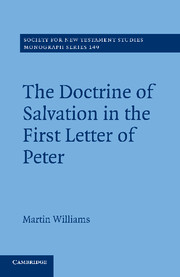1 - Theological-Critical Exegesis
from Part I - Methodology
Published online by Cambridge University Press: 05 November 2011
Summary
Introduction
This study is an exercise in what we might call ‘theological-critical exegesis’ as opposed to (merely) ‘historical-critical’ or even ‘historical-grammatical’ exegesis (though it is no less than these). Historical criticism tends to focus on what lies behind the text rather than in the text itself. ‘Historical criticism seeks to answer a basic question: to what historical circumstances does this text refer, and out of what historical circumstances did it emerge?’ Since the Enlightenment, most biblical scholars in the university or seminary have by and large adopted a strictly historical approach to the study of the biblical texts in order to concentrate on historical ‘facts’ rather than theological ‘values’. As a result, the text came to be viewed as ‘a means to a historical end, namely, the reconstruction of what really happened’. Theological-critical exegesis, on the other hand, does not dispense with all of the methods of historical criticism, but resists seeing them as an end in themselves. The difference between the two, then, lies not so much in methodology (though we will see some significant differences) but in the ultimate aim of interpretation. For the theological exegete, the goal of interpretation is to hear the word of God and to behold the glory of God in Scripture and to be transformed by it (personal transformation is preferred over historical reconstruction and doxology is preferred over methodology). Theological-critical exegesis, then, is to be governed by the following convictions (many of which will be enlarged upon below): (1) that the principal interest of the Bible’s authors, of the text itself, and of the ongoing Christian community over time was theological: reading the Scriptures therefore meant coming to hear God’s word, to know God better, and to be transformed by that knowing; (2) that the ultimate goal of biblical interpretation is beholding the glory of God in Scripture; (3) that there is a correspondence between the words of Scripture and the Word of God (the ‘Scripture principle’); (4) that a proper reading of Scripture is that which attends to the whole of Scripture as canon (the ‘canonical principle’); (5) that all theological interpretation is to be submitted to the biblical text (and not the interpreting community) as the ultimate authority and final arbiter on all theological matters; (6) that exegesis will be oriented towards specifically theological questions; (7) that scholarly tools and methods may be usefully employed in the theological exegesis of Scripture to the extent that they illuminate points 1–6 above; (8) that a theological interpretation of Scripture must occur ‘in the Spirit’; (9) that theological interpretation will ideally be practised in community; (10) that a theological interpretation of Scripture will be carried out in dialogue with other faith traditions (the ‘catholic principle’); (11) that the present fragmentation of theology into a set of discrete and disconnected disciplines (i.e., Old Testament studies, New Testament studies, systematic theology, practical theology, church history, etc.) is to be resisted. While each discipline will have some inevitable division of labour, we must labour as far as possible to overcome these distinctions. Before moving on I want to say a little more about this fragmentation.
- Type
- Chapter
- Information
- The Doctrine of Salvation in the First Letter of Peter , pp. 11 - 40Publisher: Cambridge University PressPrint publication year: 2011



